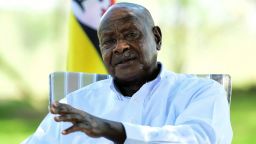Uganda’s hardline President Yoweri Museveni has warned citizens planning anti-corruption protests Tuesday that they are “playing with fire.”
The upcoming protests come after a wave of deadly anti-government demonstrations that rattled neighboring country Kenya where at least 50 people were killed in clashes with security forces, according to figures released by the National Commission on Human Rights.
Museveni, 79, who has ruled the East African nation with an iron fist for nearly four decades, said in a televised address on Saturday that the anti-corruption march will not be allowed.
“What right… do you have to seek to generate chaotic behavior? … We are busy producing … cheap food, other people in other parts of the world are starving… you here want to disturb us. You are playing with fire because we cannot allow you to disturb us…”, Museveni said in the three-hour-long wide-ranging address.
Many young Ugandans say on social media they plan to go ahead with the march to the country’s parliament despite the country’s police refusing to grant a permit for the protest.
The Uganda Police Force described the planned protests as “potentially anarchic” in a statement on Monday, warning it “shall not tolerate disorderly conduct.”
Some defiant youth protesters who plan to join the march on Tuesday have begun sharing their photos on social media, urging fellow citizens to remember them if they don’t make it home alive.
“Just in case I get abducted or I die in the march, you can use this (photo) for creating awareness. Otherwise, tell mum I played a fundamental role in saving my country! I know she will be happy!”, said one activist Ashiraf Hector on X.
Another wrote: “Tomorrow, very early in the morning, I will join my fellow young people as we march to parliament against escalating corruption in Uganda. We will come face to face with murderers and in case things go south for me, this is my official portrait.”
A group of lawyers and activists said in a letter on Sunday that the police could not, by law, stop peaceful protests.
“The police cannot prohibit a demonstration from proceeding but have powers to regulate it to ensure it takes place within confines of the law,” the letter said while urging President Museveni to “ensure that the constitutional right to assemble, demonstrate peacefully … is not violated with impunity by security agencies.”
Crackdown ahead of protests
Ugandan opposition leader Bobi Wine?said on Monday he supported the protest which he clarified was “organized by the young people of Uganda” and not his NUP party.
Wine raised the alarm that his party’s secretariat had been cordoned off by security forces and some party leaders had been “violently arrested” ahead of the Tuesday march.
“The effort by the regime to clamp down and make it (the planned protest) look like?an NUP?initiative is meant to weaken it because they want to make it appear like a partisan matter,” he said in a statement on X.
Uganda grapples with widespread government corruption with an estimated Sh. 10 trillion?($2.7 billion) in public?funding?diverted?each year, according to its anti-graft body, the Inspectorate of Government (IGG).
Last year, it scored 26 on Transparency International’s Corruption Perceptions Index which ranks countries on a scale of zero to 100, with zero meaning “highly corrupt” and 100 signifying that a country is “very clean.”
“The thieves are parasites that must be stamped out,” Museveni said about his administration’s fight against graft last month, adding that his ruling NRM party “does not victimize anybody without proof (of corruption).”
“That is why some people think that the NRM is soft on corruption,” he said, stating that some corruption cases against public officials were being decided in court.
However, those agitating for a protest are unimpressed with the government’s handling of corruption, urging Ugandans to “#March2Parliament” on July 23 to “#StopCorruption.”’.
Some have also called for the?speaker of?the?parliament, Anita Annet Among, to resign. She was among high-profile Ugandan politicians?sanctioned by the United States and the United Kingdom for corruption earlier this year.
“Among is designated due to involvement in significant corruption tied to her leadership of Uganda’s Parliament,” according to the US State Department.
?Among has pushed back against the sanctions, calling them “politically motivated” and claiming they were triggered by Uganda’s defiance of international pressure after passing a strict anti-LGBTQ law last year.


